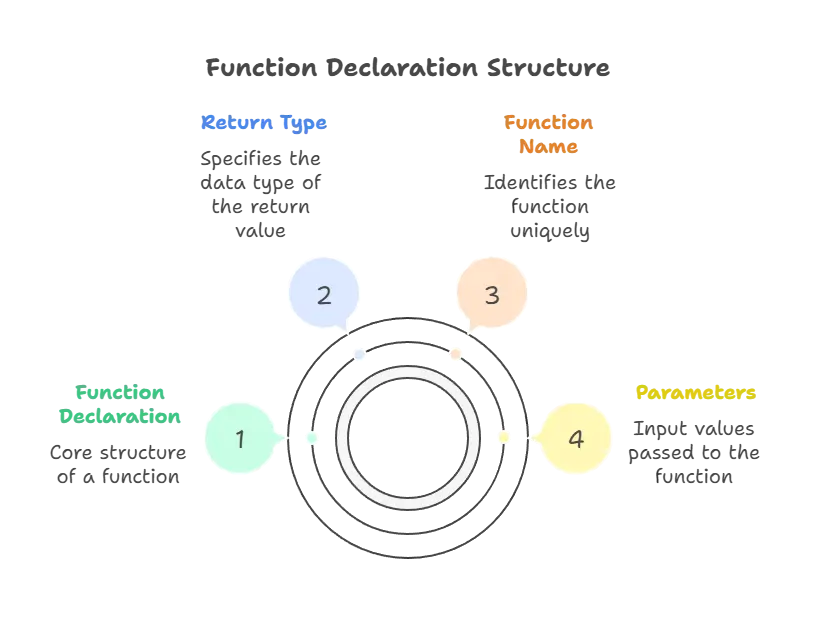Function Declaration in C++
Function declarations in C++ play a crucial role in informing the compiler about the existence of functions and their signatures before they are used in the program. They provide a blueprint of the functions, including their return type, name, and parameters, allowing the compiler to perform type checking and ensure proper function usage.
Basic Structure of a Function Declaration
A function declaration in C++ typically consists of the following components:
- Return Type: Specifies the data type of the value returned by the function. It can be
voidif the function doesn’t return any value. - Function Name: The identifier that uniquely identifies the function.
- Parameters: Input values passed to the function. They are optional, and a function can have zero or more parameters.

// Function declaration with return type and parameters
int add(int a, int b);
Declaration vs. Definition
It’s important to understand the difference between function declaration and definition in C++:
- Declaration: A declaration introduces the function to the compiler and provides information about its return type, name, and parameters. It doesn’t contain the actual implementation of the function.
- Definition: A definition includes the implementation of the function, providing the actual code that gets executed when the function is called. It contains the declaration as well.
// Function declaration
int add(int a, int b);
// Function definition
int add(int a, int b) {
return a + b;
}
Advantages of Using Function Declarations
- Modularity: Function declarations promote code modularity by allowing functions to be defined separately from their usage, making code organization more manageable.
- Early Detection of Errors: Function declarations help detect errors such as incorrect function calls or mismatched arguments at compile time, enabling early detection and resolution of issues.
- Improved Readability: By providing a clear outline of the functions used in a program, function declarations enhance code readability and understanding.
Examples
Function with No Return Type and No Parameters
// Function declaration with no return type and no parameters
void greet();
Explanation:
- This function declaration indicates that there’s a function named
greetthat doesn’t return any value (void) and doesn’t accept any parameters.
Function with Return Type and Default Parameter
// Function declaration with return type and default parameter
int multiply(int a, int b = 1);
Explanation:
- This function declaration specifies a function named
multiplythat returns an integer (int) and takes two parameters (aandb), withbhaving a default value of1.
Function with Reference Parameters
// Function declaration with reference parameters
void swap(int& a, int& b);
Explanation:
- This function declaration declares a function named
swapthat doesn’t return any value (void) and takes two parameters (aandb) by reference (&). This allows the function to modify the values of the arguments passed to it.
Function with Pointers as Parameters
// Function declaration with pointer parameters
void printArray(int* arr, int size);
Explanation:
- This function declaration specifies a function named
printArraythat doesn’t return any value (void) and takes an integer pointer (int* arr) and an integer (int size) as parameters. It is used to print the elements of an array.
Function with Variable Number of Arguments
// Function declaration with variable number of arguments
int sum(int count, ...);
Explanation:
- This function declaration declares a function named
sumthat returns an integer (int) and takes a variable number of arguments. The...indicates that the function can accept any number of arguments after the specified parameter (count).
Function declarations are essential components of C++ programming, providing a means to declare the existence of functions and their signatures before their usage in the program. By understanding the basics of function declarations, programmers can ensure proper function usage, promote code modularity, and improve code readability and maintainability.Happy coding! ❤️
